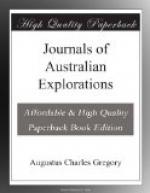26th September.
Left the bivouac at 7.15 a.m.; course north; the country more open; 9.25 came on a large native well of good water in a slight hollow trending westward; having watered the horses and filled the kegs, continued our journey over sandy plains, covered with short coarse scrub; many hummocks of loose sand, covered partially with scrub, lay on each side of our track. At noon passed the last sandy ridge; before us lay an immense plain, covered with thickets, and not a hill or valley could be observed—the country seemed to settle into one vast level of dense and almost impenetrable scrub or thicket. At 1 p.m. entered it, and continued our route through it; although the bush-fires, which had burnt some large patches, greatly assisted us; 4.15 not finding any grass, we steered west, but at 5.15 were compelled to halt for the night in a dense thicket, without a single blade of grass or even scrub of any kind which could afford food for the horses; water it was hopeless to look for; and after a supper of raw bacon, damper, and a pint of water each, we retired to rest.
Waterless country and dense scrub north of Murchison river.
27th September.
At 7.0 a.m. set out on a north course; at 8.5, finding the thicket almost impassable, I ascended a cypress-tree, where a most cheerless view met my sight to the north, east, and west; not a break was visible—nothing but thicket in all directions, with scarcely an undulation of any kind; the view to the north-west was most extensive—nearly twenty miles of thicket could be seen, with a surface as level as the sea. Not considering it prudent to proceed onwards, the thicket being too dense to advance without the greatest difficulty, the saddle-bags




